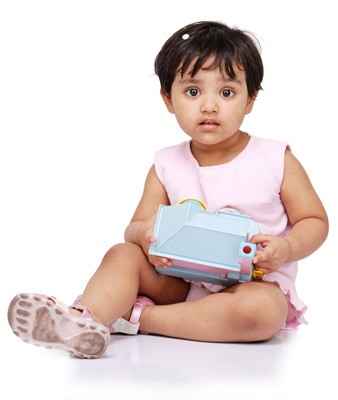What to Expect as Your Child Grows:
Well Child Care at 3 Years
Behavior and Discipline
Positive reinforcement encourages good behavior in three-year-old children. Try to catch your child being good. Tell your child how proud you are when she does what you want her to do. Be positive and enthusiastic with good behavior.
Here are some good methods for helping children learn about rules:
- Divert and substitute. If a child is playing with something you don't want her to have, distract her with another object or toy that she enjoys.
- Teach and lead. Pick your battles carefully. Have as few rules as possible (mainly for your child's safety), and, once established, enforce them all the time. When rules are broken, immediately find a place for your child to sit alone for three minutes. A good example of this is a crib or pack-and-play, where the child is safely confined. It is very important that a time-out comes immediately after a rule is broken. The less you say and the quicker you act, the better.
- Make consequences as logical as possible. For example, if you don't stay in your car seat, the car doesn't go. If you throw your food, you don't get any more and the meal is done.
- Be consistent with discipline. Don't make threats that you cannot carry out. If you say you're going to do it, do it.
Reading and Electronic Media
- Children learn about reading skills while reading with you. They figure out that printed symbols have certain meanings. Young children love to participate directly with you and the book. They open flaps, ask questions, and make comments. Encourage them as they do this.
- Television viewing should be limited each day.
- Computer games can be educational and are great for fine motor skills. However, computer time should be limited as well.
Dental Care
- Brushing teeth regularly after meals is important. Think up a game and make brushing fun.
- It is time to make an appointment for your child to visit the dentist.
Safety Tips
- Child-proof the home. Go through every room in your house and remove anything that is either valuable, dangerous, or messy. Preventive child-proofing will stop many possible discipline problems. Don't expect a child not to get into things just because you said not to do so.
- Fires and Burns
- Practice a fire escape plan.
- Check smoke detectors. Replace the batteries if necessary. Check food and water temperatures carefully. They should not be too hot.
- Keep hot appliances and cords out of reach.
- Keep electrical appliances out of the bathroom.
- Keep matches and lighters out of reach.
- Do not allow your child to use the stove, microwave, hot curlers, or iron.
- Turn your water heater down to 120° Fahrenheit. - Falls
- Teach your child not to climb on furniture or cabinets. Do not place furniture (on which the child may climb) near windows or on balconies.
- Install window guards on windows above the first floor (unless it is against your local fire codes).
- Lock doors to dangerous areas like the basement. - Car Safety
- Use an approved toddler car seat correctly.
- Sometimes toddlers may not want to be placed in car seats. Gently put your child into the car seat every time you ride in the car.
- Give your child a toy to play with once in the seat.
- Parents should wear seat belts at all times.
- Never leave your child alone in a car. - Pedestrian Safety
- Hold on to your child when you are near traffic.
- Provide a play area where balls and riding toys cannot roll into the street. - Water Safety
- Continuously watch your child around any body of water. - Poisoning
- Keep all medicines, vitamins, cleaning fluids, and other chemicals locked away.
- Program the poison control center number in all phones.
- Buy medicines in containers with safety caps.
- Do not store poisons in any drink bottles, glasses, or jars.
Smoking
- Children who live in a house where someone smokes have more respiratory infections. Their symptoms are also more severe and last longer than those of children who live in a smoke-free home.
- If you smoke, set a quit date and stop. Set a good example for your child.
Immunizations
- Routine infant vaccinations are usually completed before this age; however, some children may need to catch up on recommended shots at this visit.
- Children over six months of age should receive an annual flu shot.
- Ask your doctor if you have any questions about vaccines.
Next Visit
A once-a-year check-up is recommended.



